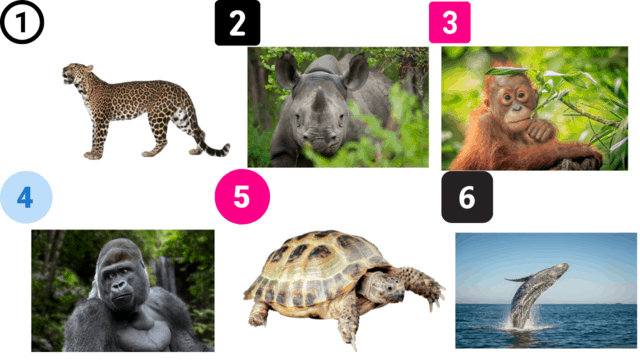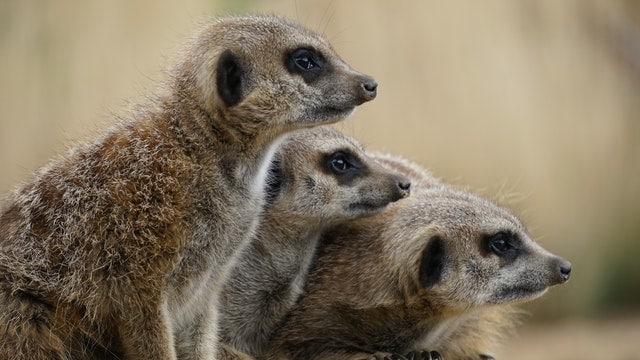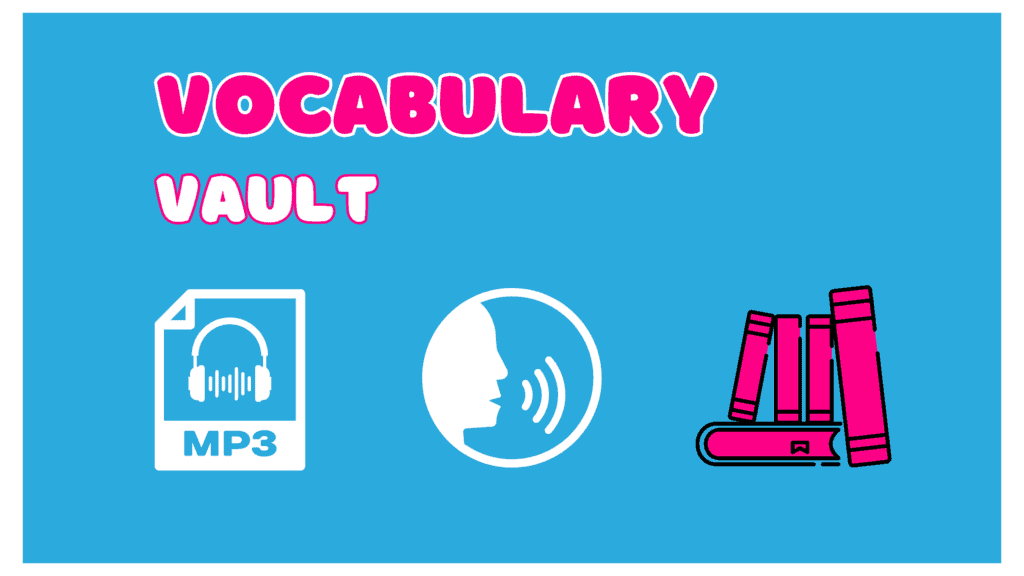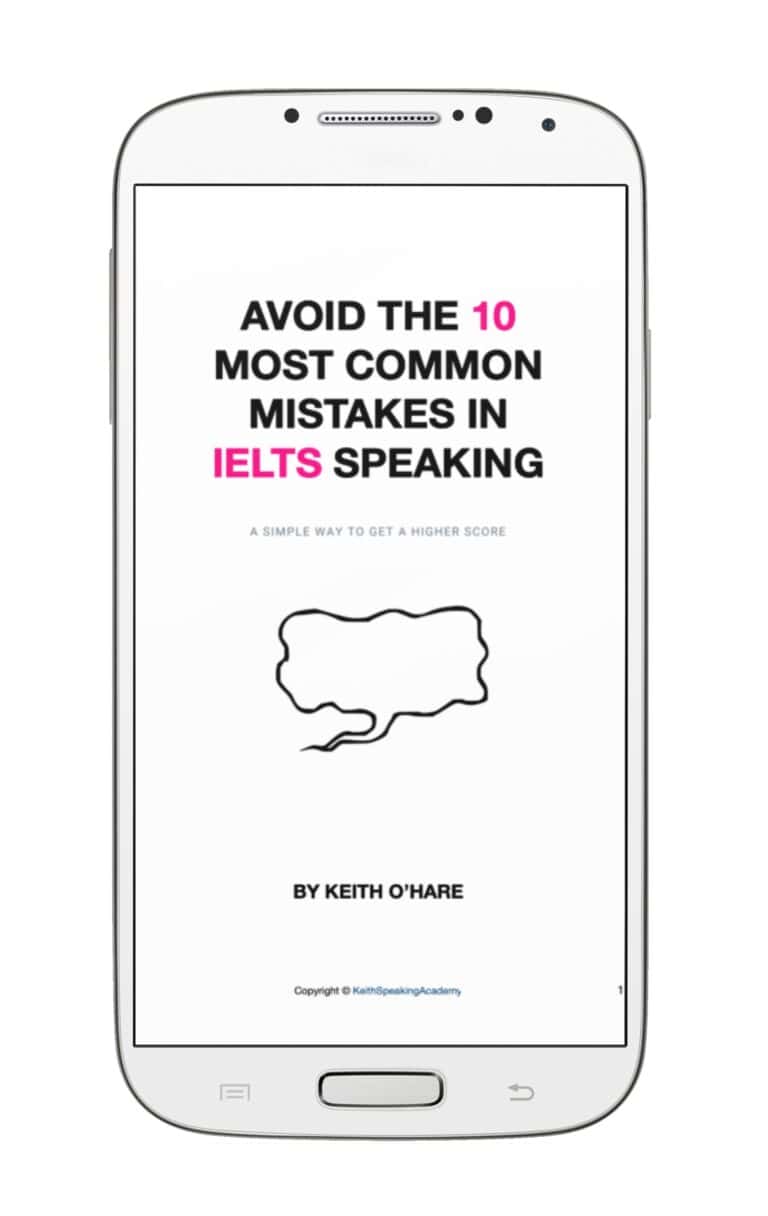IELTS Speaking Lesson about Protecting Animals
👇 Take this lesson with you! 👇
In IELTS Speaking, wild animals is a common topic and in this lesson we will discuss endangered animals, and how we can protect them.
We will look at essential vocabulary, idioms and popular debates.
Table of Contents
IELTS Speaking vocabulary: Protecting wild animals
When talking about animals, many students make the following mistake:
Polar bear is in danger 😣
What it should be, is one of the following:
Polar bearS ARE in danger 😁
THE polar bear is in danger 😁
When talking about animals in general we should use either the singular with ‘THE’ or use the plural.
_____
Here is some useful vocabulary you should know to help you talk confidently about this topic
Wildlife = animals living in the wild (in nature).
To be extinct = to no longer exist
The dodo was a flightless bird, but it is now extinct
The following expressions mean something may become extinct in future:
- To be in danger of extinction
- To be endangered
- To be a threatened species
- To be a vulnerable species
The following words mean to kill an animal
- To poach = to kill an animal illegally
- To hunt = to chase and kill an animal
- To slaughter = to kill livestock usually for food
Vocabulary connected to the environment
Ecosystem (n.) = a natural environment, where everything is connected.
A balanced ecosystem
To be out of balance
Killing animals can put the ecosystem out of balance
Habitat (n.) = living space of animals
The natural habitat
Species (n. singular and plural)
Population (n.)
The population of turtles is decreasing
To live in the
- wild (in nature)
- wilderness
- jungle
- rainforest
- desert
- sea
- tundra
IELTS Speaking lesson: Protecting wild animals - task
Which of the following animals are in danger?
Find out more here.
Click arrow to open/close answers

Tell me about a wild animal that is endangered and why it is in danger.
Write your answer in the comments below.
IELTS Listening: The importance of protecting wild animals
Listen to the passage in the video and answer this question
- Is the speaker for or against saving endangered animals?
Click arrow to open/close answers
Listen again and fill in the gaps with one word only.
- It is far too _____ to save endangered animals
- The money is ________ spent saving humans
- We are not ______ on Pandas, so there is no need to save them
- When animals __________ it is just nature at work
- We shouldn’t ________ nature from taking its course
Click arrow to open/close answers
- It is far too _costly / expensive____ to save endangered animals
- The money is __better___ spent saving humans
- We are not _dependent / reliant_____ on Pandas, so there is no need to save them
- When animals ___disappear______ it is just nature at work
- We shouldn’t ___stop_/ prevent ______ nature from taking its course
Listening Passage tape script is at bottom of the page

How we can protect endangered animals
- Build sanctuaries or zoos
- Set up conservations centres
- Stop poaching and hunting
- Reduce deforestation
- Raise awareness of the issue (on social media)
- Help the endangered animals to breed (=to reproduce)
- Provide food and shelter
- Don’t interfere with / in their habitats
- Support a charity like WWF
- Stop buying products that come from hunted animals
Find out more about ways to protect threatened animals here:
https://www.endangered.org/15-ways-to-help-protect-endangered-species/
Speaking meditation and visualisation

Idioms to talk about wild animals
Like a bull in a china shop = clumsy
To have the memory of a fish = short memory
I feel like a fish out of water = don’t feel comfortable
That’s another kettle of fish = something completely different
I drink like a fish = too much (alcohol)
To wreak havoc = cause big problems (chaos)
Poaching is wreaking havoc with the ecosystem
I don’t stand a chance = have no possibility / it’s very difficult
These animals don’t stand a chance, unless we protect them
To be on the brink of = on the edge of / not the verge of
Pandas are on the brink of extinction
The elephant in the room = the obvious thing that nobody is talking about
Listening tape script
Should we protect wild animals?
The first reason not to bother with protecting some endangered species is the astronomical cost. Surely, there are better ways to spend those millions of pounds, such as education, hospitals, starvation and the like.
What’s more, some species like the wolf are a danger to humans, as well as the livestock we keep. Why should we save them? As for the cute panda, it’s not like we depend on them, surely it’s just a waste of money trying to rescue them from the brink of extinction. (The edge of extinction)
Let’s not forget as well, mass extinctions happen as a part of nature. Remember the dinosaurs? If the disappearance of certain species is a part of nature, why should we interfere?
My Listening Passage was based on a text adapted from the BBC
http://www.bbc.com/earth/story/20150715-why-save-an-endangered-species
Pronunciation Files For Vocabulary From My Best Live Lessons
Use Words EASILY in English Conversations!
More Free IELTS Speaking Lessons
If you liked this lesson, leave a comment below!
There are more lessons you can follow in the links below too.
PHOTOGRAPHY in IELTS Speaking. Learn vocabulary of taking, storing and sharing photos.
ENVIRONMENT in IELTS Speaking. Learn different ways to protect our environment and discuss it with idioms and vocabulary in this lesson.
FEELINGS in IELTS Speaking. Vocabulary you need to describe a range of different feelings, as well as talking about topical issues such as mental health.



Anatolian leopard, which is a native to Turkey, is becoming extinct. Due to the poaching for their fur, this authentic type of leopards has decreased year by year. Although animal rights advocacy groups have raised their voice to stop these illegal acts of killing, some people have continued to hunt Anatolian leopards.
By and large , I reckon in India Malabar Civet ,. Andaman White-toothed Shrew ,Kashmir stag/hangul , Large Rock Rat or Elvira Rat, Namdapha Flying Squirrels,Himalayan Brown/Red Bear ,Pygmy Hog are the critically endangered species . The reason behind the decline in their population is human intervention through development projects, logging and grazing.
Elephants are the largest land animal in the world and fasinating gentle giants.unfortunatly these species may not be around us for centuries more.They are now endangered status.The main causes are hunting and habitat loss .Many herds were hunted for their ivory tasks and for their skin.
In addition , humans use traditional elephant territery for farms and houses,forcing elephants into smaller areas with no food and water .
After researching a couple years ago wildlife in Asia, Many researchers point out that the biggest animal on land are being hunt illegally for only main reason because of a priceless collection of ivories which go decoration and fashion nowadays. Overall the population of the animals are dropped and endangered at the moment. As a result of saving from extinction ,the Government should eye on those wildlife threatened species.
Many research show that blue whale is threatened by enviromental change. Firstly, the sea pollution becomes much more serious nowaday, which lead to the damage of the habitat of blue whale. Secondly, the size of blue whale is huge, so they can provide large amount of food for human, that why more and more people try to slaughter them. At a result, the population of blue whale drops significantly in recent years. So the natural reservation organization should do realistic actions in order to protect this genre of vuneralble species.
Personally, rhinos are in danger of extinction for two reasons. First, their habitats are diminishing because people clear land for agriculture. Second, they are poached or their horns for medical purposes. Horns are made of keratin which are substance of hair and nails, but there has not scientific support for it.
Öne studies have shown not has 😊
It is a no brainer that whenever we want to find a solution to whatever kind of problem we might encounter, the most efficient way to do that is utterly looking for the cause that lies behind that specific dilemma. unquestionably, the whopping affair of the endengered species in the world in general is triggered by us humans, by our irresponsible behavior towards nature deliberately or accidentally. I mean in my humble opinion, I do believe that, everyone among us is in a way or another responsible for all the catastrophes regarding nature which number has steadily grown in the last couple of years. Take for example the case of the scalloped hammerhead sharks which are categorized as top level carnivores; they are unfortunately threatened by commercial fishing and it goes without saying that their existence is of paramount importance to maintain the ecological balance of the seas. I reckon that one of the tiniest efforts we can do is; be more and more eco-friendly and it seems to me that the volunteering organizations should incentivize people by providing the right explanation and be an eye opener to all those who are thoroughly unaware and oblivious.
I am on the fence of this one, but you know, if I have to choose, I reckon that rhinos are one of the most endangered animals in the world. Because, base on the demand of some people for healing so there are many hunters poach rhinos for the horns. But some studies had shown that the rhino horns and our nail, hair are extremely similar!
In European Union Finland (and Estonia) has the main responsibility to strictly protect the present-day and the future of the Siberian Flying Squirrel.
The reason of the possible extinction is due to the destruction of this great and funny animal´s habitats (old forests) which of course is linked with climate change.
(I found your fantastic YouTube channel etc. by accident just about a week ago and started
my English lessons after 40 years´ pause. So I do a lot of mistakes!)
Royal Bengal tiger in Bangladesh are in danger of extinction because of deforestation.
Orangutans Are the most endangered great apes species, they face great danger due to urban sprawl and it’s particularly difficult for them to recover from the population decline cause of their low reproductive rate.
are**
I would like to tell you about Pangolins. Actually, Pangolin is found in an Asia and Africa. So, that is called Asian and African mammal. Panglins’ has a body covered with horny overlapping scales. It has sticky tongue to slaughter ants and termites, a small head with an elongated snout and a long tail. Its so sad that Pangolins are also endangered as many other animals. Pangolins are hunted to fulfill the needs of traditional medicines and fashion accessories, particularly in China and Veitnam. The huge trafficking is driving down their numbers. Therefore, i think Pangolins become threatened species.
Nowadays more and more wild animals in danger of extinction becase of human being’s atrocious hunting.
Tigers are in danger of extinction. Because mainly of the erosion of jungles by the humans. And in india tigers are pouched most of the times for their skin, nails, teeth etc, which has some superstitious significance.
The Komodo is vulnerable species and will be dropped shot significantly due to climate Change and global warming. Komodo is predicted to no longer exit if the government can’t protect habitats from the climate changing.The Komodo has serreted teeth is what makes dragons so deadly
One of the wild animals that are in danger is an elephant. They have been poached for their ivory tusks. Their habitat is shrinking too. It is said that Asian elephants have lost 85% of their original habitat. The authority says the recent roaming of the herd of wild elephants in China was caused by their food shortage and decreasing habitat. I hope they will go home safely.
These days wild animals are going under extinction because of loss of habitat, which is because of man-made disasters like deforestation, on top of that, they cannot find food to eat in forests because of these consequences and they are trying to enter into cities and towns. For example, during this COVID-19 pandemic, many animals in India like tigers, elephants are seen walking on roads because we occupied their place by constructing buildings.
I reckon that elephants (such as rhinos) are in danger of extinction and this is mainly due to the poachers who kill them illegally just to achieve their ivory tusks. These ones are considered really precious and powerful in a lot of cultures, mind you trading them on ivory black market it represents a tremendous threat for this species . Hopefully, the governments of the countries in which elephants live, had better enhance the inspections and introduce new strong regulations without any U-turns.
P.s. Tomorrow at 10 a.m. I’m practicing in my classroom, I look forward to seeing you next time for my first live lesson! 👋🏻
Thank you so much for your wonderful effort to teach IELTS test takers and boosting us with all new valid topics which contains bundle of vocabulary, I salute your activeness while making a video,its not only just YouTube but also extraordinary teaching session for all
That is very kind – thank you!
Many species recorded are endangered, snow leopard one of this animals because of illegal tradeof skin and body parts.
I think the one of the endangered animals is polar bear, owing the global warming that affect climate in the North Pole, rise of temperature make the ice smelting and sea level become higher. This situation threatening their survival.
Talking about a wild animal which has been danger of extncion is snow leopard due to destruction of their habitats and poaching. It is important to protect them but it is tough nut to crack and soon they will becom exteint.
Wow, I love elephants,wonderful wild animals, they hold symbolic, cultural and economic importance in Sri Lanka and also they attract tourists. Sadly,now Srilankan Elephants are critically endangered due to habitat loss.
Development of infrastructure and expanding agriculture cause interference of human in to the natural behavior of elephants lead to shortage of food and water and they die by starving.So, they unintentionally destroy the cultivations of the villagers in order to quench their prolonging starvation, end up with human elephant conflict and cause the death,this is happening in Sri Lanka.
There are several animals that are known to be in danger of extinction in the Philippine wildlife. One of these, is the Philippine eagle or also known as the monkey-eating eagle which is commonly found in the forests of the Philippines. Because of persistent deforestation, legal or illegal, the natural habitat of this specie is severely compromised which results of this animal being endangered. The government started to get a grip with the problem by implementing laws and regulations with illegal deforestation and also, against the unlawful hunting of those threatened species especially the Philippine eagle.
In Poland the local wildlife consists of wild species such as the lynx, chamois, wild cat, stag and black stork, in addition to the classic European species such as the hare, boar and fox. The European bison, threatened with extinction, is protected in the Bialowieza forest.
Species become endangered for two main reasons: loss of habitat and loss of genetic variation. A loss of habitat can happen naturally. Human activity can also contribute to a loss of habitat. Development for housing, industry,increasing urbanisation and agriculture reduces the habitat of native organisms.
There are numerous species currently in danger of extinction. Most of them are caused directly or indirectly by man: climate change, destruction of their habitat illegal hunting, etc.
Nowadays, Tiger alive only in zoos because of human invasion of its habitat and poaching.
Red tuna, in serious danger of extinction due to the sushi boom.
There is a danger of extinction of killer-whales due to the noise pollution from ships, overfishing and climate change. Killer-whales communicate with each other by sounds but it became more difficult for them because of disturbing motor sounds from ships. People threaten their habitat by increasing fishing so killer-whales don’t have enough food for survival.
I
Here in Myanmar Ayeyarwaddy dophins are in the danger of extincts.They are fresh water species habiting in Ayeyarwaddy river the longest one in Myanmar.They are currently being poached by foolish fishermen.The reason is that these dophins have cute smiling faces.They want to hunt and sell them so they can get a lot of money.Now there is only a few left nowadays.Although the government ordered the laws to protecf them ,being poor country make the laws uneffective.
Nice answer and what a shame about the dolphins. Just note: ‘in danger of EXTINCTION’ 😁
The Iberian lynx in in danger of extinction because the human have invaded his habitat, many time it is run over by car.
I will talk about the African elephant which is the largest animal walking the earth. There’re two species of it, the Savanna and the Forst elephant. There’re a great difference between the two subspecies. The Forst one is smaller and darker than the savanna elephant.They are in sharp decline due poaching for international ivory trade.
Snow leopards are in danger of extinction because of human hunting and encroachment of their habitats, and what is worse, their habitats could decrease shortly due to climate change.
Very true and well written!
The black rhino is still considered critically endangered due to poaching and black-market trafficking of rhino horn.
Tigers to be precise, are on verge of extinction in many part of the world due to relentless poaching and hunting for their products like skin and bone wine due to its health benefits. Tiger hunting is considered as prerogative for affluent segment of the society in some devepoing nations.
Polar bear is in great danger as a result of global warming, glacial melting makes his life really difficult . he can’t move liberly and search for food like before. Their numbers decreased massively in few years though, therefore we must step up and do anything to move back the clock otherwise we’ll see them only in museums.
Nice – just note if you use the singular, you should say ‘THE polar bear is..’, otherwise use the plural ‘polar bears are in danger.
Hi!
In the Rierada, Molins de Rei, near Barcelona we have bat in great danger!
What a pitty!
Andrea
Studies has shown that the population of bees is declining rapidly as artificial chemicals or pesticides utilized in farming are posing threat to their livelihood. As famous scientist Einstein had once said, if bees were to become extinct sometime then humans can consider that their end is very near. Hence, it’s extremely important to not indulge in any practices that can endanger these species.
Fantastic answer and vey insightful.